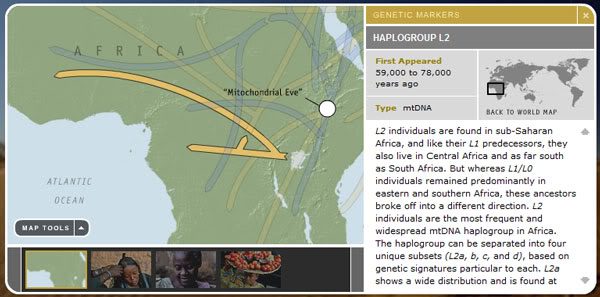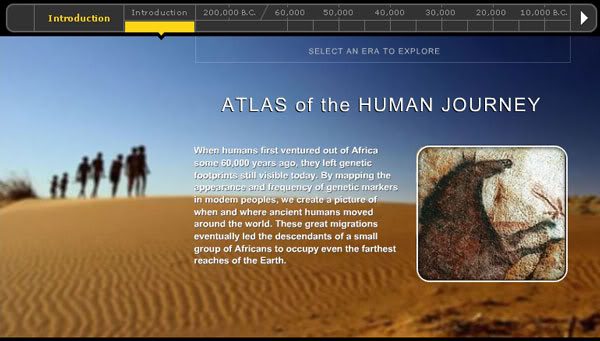I’ve been searching for my roots. National Geographic’s Genographic Project is a genetic anthropology study that aims to map historical human migration patterns by collecting and analysing DNA samples from hundreds of thousands of people from around the world.
The theory is that our story begins in Africa between 150,00 and 170,000 years ago. About 60,000 years ago, we decided to venture out. Eventually, we reached Central Asia, Europe, and the Americas, leaving genetic footprints along the way.
Since I know next to nothing about my ancestry other than some general and vague ideas about my Cuban roots, I decided to participate even though it’s not really a genealogical study. I purchased the $100 self-test kit. You swab the inside of your cheek with a fancy cotton tip, collecting your DNA in the process, and send it off to be analysed. It’s takes a few weeks to get the results. I tried to time it so I would have them by Samhain. The results are in.

I belong to haplogroup L2. My maternal ancestors set out from their original homeland in East Africa and eventually made their way all over Africa, particularly into West Africa where their lineages are most common. Believed to have first appeared between 59,000 to 78,000 years ago, L2 individuals are found in sub-Saharan Africa and are the most frequent and widespread mtDNA (mitochondrial DNA) haplogroup in Africa. L2 is considered the signature Bantu haplogroup, accounting for around half of the genetic lineages found in the southeast African Bantu populations. L2 is also the most predominant African-American mitochondrial lineage, found at about 20 percent in the Americas, the likely result of West Africans being brought to America during the Atlantic slave trade.
At first, I wasn’t quite sure what I was looking at. I thought that if we all come from Africa, then we must all have the same genetic markers. That’s not exactly right. Mutations keep happening and new genetic markers appear. For instance, group three has the markers of groups one and two, but one and two don’t have the markers of three. It’s more complicated, but you get the gist. This helps us track migration. For example, haplogroup R1B appeared about 35,000 years ago and dominated human expansion into Europe. Haplogroup D2 appeared about 30,000 years ago in Southeast Asia and is most commonly found today in Japan. Haplogroup Q3 was born in North America only about 10,000 years ago.
It was only when I began looking at other haplogroups that I started realising the significance my group. L2 was begat by L1, which was begat by the mother herself, Mitochondrial Eve. L3 are the first modern humans to have left Africa.
As I mentioned before, L2 is my maternal ancestry. As a female, my mitochondrial DNA is tested. Males have the option of testing their mitchondrial DNA or their Y chromosome. It’s possible my father belongs to a different haplogroup.
Have you ever done one of those DNA tests? If so, what were your results?


I've considered doing this. As an adult adoptee it is especially appealing to get a glimpse at my ancient ancestry.
I highly recommend it, Mama Kelly.Very cool, Jett. Be sure to keep us posted.
Kewl results on your test. I just sent my sample in on this project about a week ago and am looking forward to the results.
I did this some time ago when the project began. It's way cool. I'm haplogroup H. Since then, I got my entire DNA analyzed. I get periodic matches, both low resolution and high. I haven't taken the time to check out any more of the process. I can't seem to avoid people dying all around me. It's getting me down. But when I resurface, I hope to delve into genealogy more. I tend to read genealogy books that are too scientifically specific for my scientifically limited background.
Thanks for writing this, Cosette! I gave my dad a kit a couple of years ago; he chose to do the Y chromosome, so I can hardly wait to do my mitochondrial. I stare at the map that came back and am utterly fascinated by the path my ancestors took through the world.
It is pretty amazing. I really like project because I have almost no genealogical records so even to catch a glimpse of my ancestry was exciting.